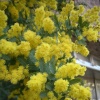Difference between revisions of "Acacia baileyana"
(→Suppliers) |
(→Alkaloid content) |
||
| Line 19: | Line 19: | ||
== Alkaloid content == | == Alkaloid content == | ||
| + | Less than 0.02% [[alkaloids]] were found in a chemical analysis of ''Acacia baileyana.''<ref>{{cite book |first=Robert |last=Hegnauer |title=Caesalpinioideae und Mimosoideae |url=http://books.google.com/books?id=YpnboQBbw7EC&pg=PA336 |year=1996 |publisher=Springer |isbn=978-3-7643-5165-6 |pages=336}}</ref> | ||
Trace amounts in seeds, Unconfirmed (tlc by J. Apleseed, ref. Trout's Notes). tryptamine and βcarbolines, in the leaf, Tetrahydroharman (TIHKAL) | Trace amounts in seeds, Unconfirmed (tlc by J. Apleseed, ref. Trout's Notes). tryptamine and βcarbolines, in the leaf, Tetrahydroharman (TIHKAL) | ||
Revision as of 10:48, 8 January 2014
| Acacia baileyana |
|
|---|---|
|
Contents
General Plant Info
Acacia baileyana or Cootamundra wattle, is a shrub or tree in the genus Acacia. The scientific name of the species honours the botanist Frederick Manson Bailey. It is indigenous to a small area of southern New South Wales in Australia, but it has been widely planted in other Australian states and territories. In many areas of Victoria, it has become naturalised and is regarded as a weed, out-competing indigenous Victorian species. Almost all wattles have cream to golden flowers. The small flowers are arranged in spherical to cylindrical inflorescences, with only the stamens prominent. Wattles have been extensively introduced into New Zealand.
Geographic distribution
[[1]]
Identification
Alkaloid content
Less than 0.02% alkaloids were found in a chemical analysis of Acacia baileyana.[1]
Trace amounts in seeds, Unconfirmed (tlc by J. Apleseed, ref. Trout's Notes). tryptamine and βcarbolines, in the leaf, Tetrahydroharman (TIHKAL)
Extraction
Other uses
Cultivation
This plant is adaptable and easy to grow. It has gained the Royal Horticultural Society's Award of Garden Merit. Unfortunately it has an ability to naturalise (i.e. escape) into surrounding bushland. Also, it hybridises with some other wattles, notably the rare and endangered Sydney Basin species Acacia pubescens. A prostrate weeping form is in cultivation. Its origin is unknown, but it itself is a popular garden plant, its cascading horizontal branches good for rockeries. The fine foliage of the original Cootamundra wattle is grey-green, but a blue-purple foliaged form, known as 'Purpurea' is very popular.
Suppliers
http://apps.rhs.org.uk/rhsplantfinder/pfregions.asp?ID=23323
Links
Cite error: <ref> tags exist, but no <references/> tag was found
